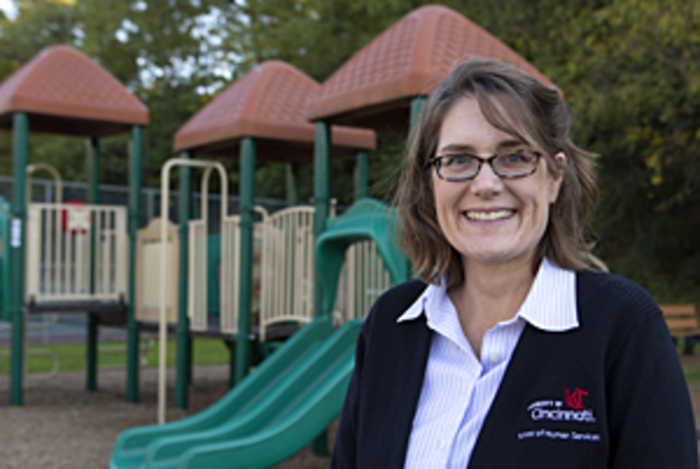Adhering to a diet and exercise program to manage health can be a challenge for anyone.

Credit: University of Cincinnati
Adhering to a diet and exercise program to manage health can be a challenge for anyone.
But maintaining a healthy weight may present unique challenges for young adults with inherent barriers such as cognitive impairment.
A pilot study at the University of Cincinnati found that young adults with autism spectrum disorder (ASD) and intellectual disabilities (ID) were able to lose or maintain their weight with a system of education and support in place.
“It was a wonderful experience to work with the young adults and see them be empowered to select their health goals,” says the study’s lead author Laura Nabors, PhD, a professor in UC’s School of Human Services in the College of Education, Criminal Justice, and Human Services.
According to the pilot study, research shows that young adults with ASD and ID are at risk for being overweight or obese and may face higher levels of health risks for cardiovascular disease, sleep disorders, gastrointestinal problems and Type 2 diabetes.
Nabors, and a team of UC faculty, undergraduates and graduate students and a disability researcher at Cincinnati Children’s Hospital Medical Center, oversaw a nutrition and exercise instructional program that involved 17 participants and guardians. Over the course of a year, the team and participants met weekly (either in person or online during COVID-19 lockdowns) and were provided lessons on healthy eating and exercise.
The lessons focused on MyPlate (the U.S. Department of Agriculture’s revised version of the food pyramid), portion sizes, vitamins and minerals in foods and learning to eat less of unhealthy food groups. Exercise lessons featured information about the importance of exercise, introduction to different types of exercise and knowledge about how exercise benefits the body. UC staff completed implementation logs and the height and weight of participants were examined at regular intervals. Parents completed surveys and participants completed group interviews to assess program impact.
The results, published in Advances in Neurodevelopmental Disorders, were that two participants lost a significant amount of weight and others maintained their weight during the study. Participants and parents were satisfied with the program and reported knowledge and behavior change.
Meeting with the participants and parents and gaining their support, Nabors says, also provided knowledge for the team and helped to involve UC students in goal selection and achievement of goals selected by participants.
“Not every week was positive, some individuals struggled to communicate with us and/or their guardians. Just like every person, we have our good days and bad days,” notes study co-author Abby Overstreet who was in her junior year as a health education and promotion major at UC when the study took place. As part of the study team, Overstreet helped create the weekly lessons and followed up with the individuals to check their progress. “Making changes to be healthier is a challenge for anyone, but with a little encouragement, they would eventually complete their goals,” says Overstreet, now a senior.
“Young adults, in this case those with ASD and ID, are more likely to get healthy if they are able to eat healthy foods they like and exercise in ways they enjoy,” says Kara Ayers, PhD, associate director of UC’s Center for Excellence in Developmental Disabilities and a researcher with Cincinnati Children’s Division of Developmental and Behavioral Pediatrics.
Co-author Christina Carnahan, PhD, an associate professor of special education in the UC School of Education, worked with the team on how best to communicate the weekly lessons to participants.
“Dr. Carnahan’s guidance on communication strategies was invaluable, ensuring health messages reached our audience,” says Nabors.
While the findings are preliminary, and research using control groups and assessing change in weight and behaviors over time are needed, the team concluded that intervention, overall, resulted in improved knowledge and health behaviors.
###
Journal
Advances in Neurodevelopmental Disorders
Method of Research
Experimental study
Subject of Research
People
Article Title
Evaluation of a Pilot Healthy Eating and Exercise Program for Young Adults with Autism Spectrum Disorder and Intellectual Disabilities
Article Publication Date
25-Aug-2021




